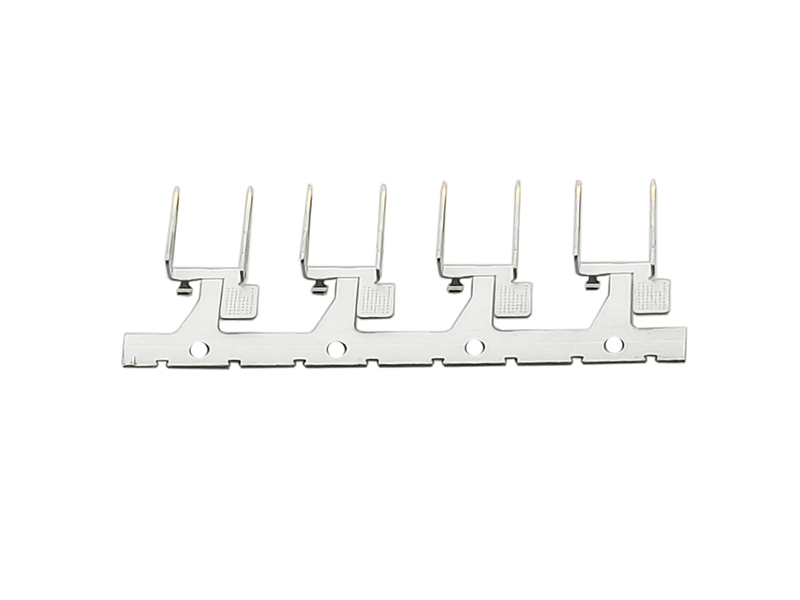Add:
Dongguan Fortuna Metals CO., Ltd
No. 226, Shida Road, Dalingshan Town, Dongguan 523810, Guangdong, China
Metal terminals play a big role in giving sure connections and conducting electric current well within an electric circuit.
The article is going to delve deep into the reasons behind this choice, explaining advantages and indicating importance in the use of metal terminals. These will help any person make a decision from a point informed, be he a DIY person or a very big expert electrician who knows much but needs some other professional insights.
But before we get to why there's always metal terminal, let's first of all understand a wiring terminal.
A wiring terminal is a small piece of equipment through which some other piece of equipment or wire is connected to a wire. It performs as a bridge that gives passage of electric current to both connected facilities. Electrical terminals are available in different shapes, sizes, and usage according to the requirement and cable size.
Terminals are used in various electrical installations for different functions. First, it secures spots for connecting wires that are likely to cause short-circuiting of electricity. Again, terminals make work easier when attaching and detaching wires, therefore enabling them to be maintained or repaired.
Now, let's get to why there is always a metal terminal.

Wiring terminals are usually made of metal due to several key advantages that metal offers in electrical applications:
1. Conductivity: Metal, especially copper and its alloys, is an excellent conductor of electricity. This means that it allows electricity to flow through it with minimal resistance, ensuring efficient energy transfer.
2. Durability: Metal terminals are rough enough and can bear the rigors of electrical connections. It exhibits adequate corrosion protection to such a degree that the maintained good connection, if met with proper care, maintains itself thereafter.
3. Strength: Metal terminals are strong and can withstand the mechanical stresses of connecting and disconnecting wires. This ensures that the connection remains secure even in high-vibration environments.
4. Heat Resistance: Metal terminals offer the greatest resistance possible to heat in situations where high levels of heat are common, such as with high-power electrical circuits.
5. Compatibility:They are versatile since they have a good level of compatibility with almost all types and sizes of wire. The use of metal terminals ensures better reliability, efficiency, and durability of an electrical connection within mostly electric systems.
Now that you already know the reasons behind the usage of metal terminal, which metal? Allow me to explain.
While a variety of metals can be used for making wiring terminals, some of the common ones include:
1. Copper: This is one such widely used metal in wiring terminals because of its fair conductivity and resistance to corrosion, besides being highly cost-effective.
2. Brass: It is another kind of metal used in wiring terminals, and it consists of an alloy of copper with zinc. This alloy gives good conductivity and corrosion resistance; and it imparts ease in manufacturing to us.
3. Aluminum: Other than Brass, the other metal that is used for wiring terminals is aluminum, especially in high voltage applications where lightweight with fairly good conductivity is required. This metal is not so corrosion-resistant like copper or brass.
4. Nickel: In some cases, nickel is used as a plating material for wiring terminals. It is primarily used due to its corrosion-resistant ability and also because it hardens the terminal, which allows for endurance.
5. Steel: Steel is much more infrequent, but it can be used in applications where steel is actually acting as a wiring terminal. Strong and durable, but it conducts less compared to the likes of copper or aluminum.
The ultimate choice of these metals is determined by the application requirements for factors such as conductivity, strength, and corrosion resistance.
Copper, quite apparently, dominates the type of metal used with regards to various reasons, and of course, good electrical conduction and cost efficiency are necessary among them.
1. Conductivity: Copper is considered a good electric conductor, just in second place to silver in the ordinary but non-precious class. The high electric conductivity leads to ensuring that the electrical energy gets a passage and reaches the terminal via copper wiring, thereby portraying a minimal loss of energy and therefore a maximum performance from each appliance.
2. Corrosion Resistance: The corrosion resistance of copper is very high compared to that of almost all other metals. Over and above, it is evident that the material from which it constructs its wires terminals provides long-term reliability and durability despite having a humidity tendency to corrosive elements.
3. Ductility and Malleability: Copper is adequately ductile and malleable so that it can be reformed without breaking, in a fashion not leading to the reduction of its electrical conductance. This is what makes it possible for the metal to develop detailed and specialized terminal designs for wiring, according to application requirements.
4. Compatibility: Copper is compatible with different types and sizes of wires. This characteristic indicates that in industry and various applications, copper is most preferred for use as wiring terminals due to its versatility. Its compatibility ensures that the copper terminals can be used with different types of wiring systems and not corroded or abraded under performance.
5. Cost-effective: Even with these outstanding properties and relative superiority to most other metals, copper is still relatively inexpensive for a high-conductivity element. To put it another way, then, copper terminals can be considered relatively cost-effective—that is if, in return for a relatively low price, considerable performance is granted.
So, now you know everything you wanted to know about the metal terminals in electronics. Whether it's a DIY project at home or a professional electricity-based one, better awareness of those basics is going to ensure sound decision-making with regard to reliable electric connections.
Copyright © 2023 Dongguan Fortuna Metals Co, Ltd. | All Rights Reserved.